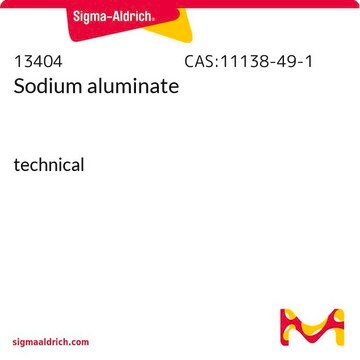307815
Sodium metasilicate
Synonym(s):
Disodium metasilicate, Disodium silicate, Sodium silicate, Sodium silicon oxide
Sign Into View Organizational & Contract Pricing
All Photos(3)
About This Item
Linear Formula:
Na2SiO3
CAS Number:
Molecular Weight:
122.06
EC Number:
MDL number:
UNSPSC Code:
12352302
PubChem Substance ID:
NACRES:
NA.22
Recommended Products
composition
SiO2, 50-53%
Quality Level
SMILES string
[Na+].[Na+].[O-][Si]([O-])=O
InChI
1S/2Na.O3Si/c;;1-4(2)3/q2*+1;-2
InChI key
NTHWMYGWWRZVTN-UHFFFAOYSA-N
Looking for similar products? Visit Product Comparison Guide
General description
SMS is a silicon source for silica materials and can be used as a chemical intermediate for silica gel catalysts.
Application
Reactant for:
- Hydrothermal preparation of thorium uranium silicate (Th1-xUxSiO4) uranothorite solid solutions
- Fabrication of dense NaA zeolite coatings
- Reactant for preparation of tungsten modified silica as catalyst for liquid phase oxidation of styrene
Sodium metasilicate (SMS) has been used in the preparation of polypyrrole/sodium metasilicate (PPy/Na2SiO3) and polythiophene/sodium metasilicate (PT/Na2SiO3) composites, novel high dielectric constant materials for use in power electronic systems.
SMS can also be used:
SMS can also be used:
- To prepare NaZnSiO3OH, a novel chiral framework material which has potential application in ion exchange, adsorption and catalysis.
- As a low-cost alternative to tetraethyl orthosilicate (TEOS) to synthesize highly ordered mesoporous silicas.
- To prepare geopolymer concrete.
Signal Word
Danger
Hazard Statements
Precautionary Statements
Hazard Classifications
Eye Dam. 1 - Met. Corr. 1 - Skin Corr. 1B - STOT SE 3
Target Organs
Respiratory system
Storage Class Code
8B - Non-combustible corrosive hazardous materials
WGK
WGK 1
Flash Point(F)
Not applicable
Flash Point(C)
Not applicable
Personal Protective Equipment
dust mask type N95 (US), Eyeshields, Gloves
Choose from one of the most recent versions:
Already Own This Product?
Find documentation for the products that you have recently purchased in the Document Library.
Eve S Steigerwalt et al.
Journal of nanoscience and nanotechnology, 2(1), 25-28 (2003-08-12)
Graphitic carbon nanofibers (GCNFs) are prepared from CO/H2 with a nickel-rich Fe-Ni (2:8) growth catalyst supported on three different water-soluble supports (Na4SiO4, Na2SiO3, and Na2CO3). GCNF products are formed with yield and crystallinity comparable to those of GCNF product produced
Eun-Jin Kim et al.
Biological trace element research, 152(1), 105-112 (2013-01-12)
Previous studies have reported that dietary silicon (Si) intake is positively associated with bone health including bone mineral density. Although the amount of Si intake is high among trace elements in humans, how dietary Si affects bone formation at the
George H Weber et al.
Journal of food protection, 67(7), 1501-1506 (2004-07-24)
Three intervention strategies-trisodium phosphate, lactic acid, and sodium metasilicate--were examined for their in vitro antimicrobial activities in water at room temperature against a three-strain cocktail of Escherichia coli O157:H7 and a three-strain cocktail of "generic" E. coli. Both initial inhibition
Subramani Saravanabhavan et al.
Environmental science & technology, 42(5), 1731-1739 (2008-04-30)
Growing environmental regulations propound the need for a transformation in the current practice of leather making. The conventional dehairing and fiber opening process results in high negative impact on the environment because of its uncleanliness. This process accounts for most
Synthesis and structure of NaZnSiO3OH, a new chiral zincosilicate framework material.
Healey A M, et al.
Inorganic Chemistry, 38(3), 455-458 (1999)
Our team of scientists has experience in all areas of research including Life Science, Material Science, Chemical Synthesis, Chromatography, Analytical and many others.
Contact Technical Service








